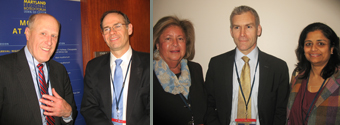UMB Encourages Entrepreneurship
The University of Maryland, Baltimore (UMB) has encouraged a culture of entrepreneurship, UMB President Jay A. Perman, MD, said in remarks at the 2015 Maryland Regional BioTech Forum.
Perman appeared with three other university presidents on a panel, “How Academia Can Help Drive Our Region’s Biotech Cluster.” The theme of the forum, “Growing Our Ecosystem,” referred to ways that corporate, governmental, and academic partners can collectively make the region a leading hub of groundbreaking science and technology.
The stated goal is to do so by 2023 in a region encompassing Baltimore, Washington, D.C., and a large part of Virginia.
Reflecting that regional vision, the academic panel was made up of UMB’s Perman; Michael Rao, PhD, president, Virginia Commonwealth University, Freeman Hrabowski PhD, president, University of Maryland, Baltimore County (UMBC); Ronald J. Daniels, JD, LLM; president, Johns Hopkins University; and the moderator, Mike Grisham, MBA, president and chief executive officer, Virginia Biosciences Health Research Corp.
The panel took place March 30 in Gaithersburg, Md., at the headquarters of Medimmune, a member of the AstraZeneca Group and one of the forum hosts. Other hosts were the Tech Council of Maryland and BioHealth Innovation.
Medimmune has been a catalyst in fueling collaboration among the state’s research universities, including Hopkins, in various ways. Several of the academic leaders emphasized the importance of building such relationships.
During the discussion and Q&A session that followed, Perman pointed out MedImmune’s role as a “key collaborator” in the Institute for Bioscience and Biotechnology Research. This partnership involves the National Institute of Standards and Technology, also located in Gaithersburg, as well as the University of Maryland, College Park (UMCP) and UMB.
“Ties with industry are strong,” Perman says of UMB, which launched a focused effort to get more of its research out of its labs and into the industry pipeline.
Last year, 200 companies sponsored more than $40 million in research at UMB, an increase of nearly 40 percent over the year before.
As part of the University of Maryland: MPowering the State initiative, UMB paired with UMCP on a collaborative technology transfer office. “It’s a space where the universities’ inventors can disclose and develop their ideas,” Perman says, and “where industry can easily identify opportunities for licensing and partnerships.” A unified tech transfer initiative is but one aspect of the universities’ combined efforts through UM Ventures.

UMB and UM Ventures leaders
Among UM Ventures officials attending the forum were Director James L. Hughes, MBA, (in photo, second from left) chief enterprise and economic development officer and vice president at UMB; Phil Robilotto, DO, MBA, (fourth from left) chief commercialization officer and assistant vice president, Office of Technology Transfer, UMB; and Gayatri Varma, PhD, (fifth from left) executive director, Office of Technology Commercialization, UMCP.
Others representing UMB included Bruce E. Jarrell, MD, FACS, (in photo, left) chief academic and research officer, senior vice president and dean of the Graduate School; and Jane Shaab, (in photo, third from left) executive director of the University of Maryland BioPark and assistant vice president, economic development.
The number of licensing deals UMB expects to make in 2015 is 2 1/2 times the number just five years ago. In the last year, licensees have announced successful Phase II clinical trials for drugs treating prostate cancer and celiac disease, and a successful Phase III trial for a cholera vaccine.
UMB engages in seed grant programs with both UMBC and UMCP, joining their engineering and computing expertise with UMB’s biomedical expertise. The older of the two programs, with College Park, has generated $10 million in new funding from the National Institutes of Health.
Acknowledging changes in the federal research landscape, Perman remarked during the panel discussion, “It’s changed, but it’s not going away.” He said a way to measure the impact of these seed grants is to answer one question. “Do they succeed in pulling down federal dollars?”
UMB has taken several steps to foster entrepreneurship, Perman told the biotech audience, such as reshaping academic incentives to reward not only publishing research but commercialization. He also cited the example of a pharmacy professor whose hiring required accommodating her dual role as entrepreneur.
Further, Perman called attention to the “site miners” at UM Ventures. These tech professionals reach out to the faculty and laboratories at UMB and in College Park to find and cultivate discoveries.



